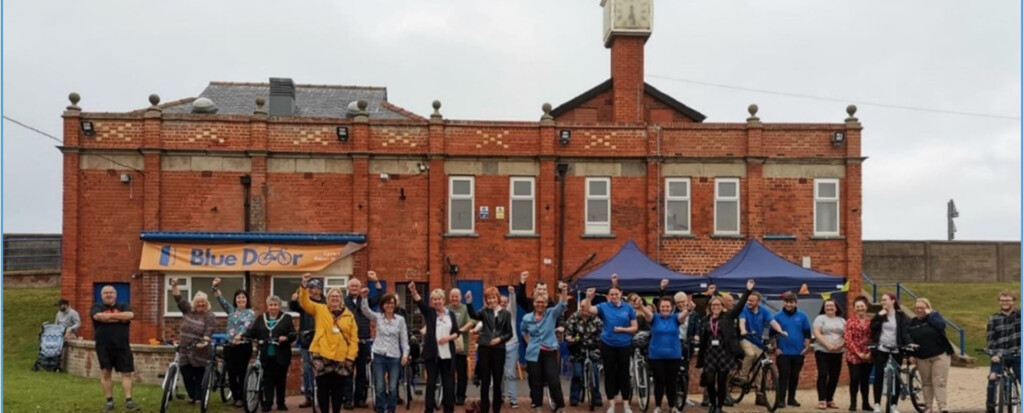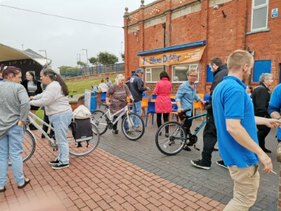Behavioural change / BITS / Cycling / Innovation / Mobility
Bicycles and ITS: The smart bicycle library
The following article is co-authored by Robin Kleine and Ronald Jorna and was originally published in Dutch for Mobiliteitsplatform.nl HERE.
Six months after the launch of the bicycle library in East Riding, England, 2,200 cycling trips have been logged. What have we learned from this new combination of rental bikes, coaching, and ITS?
On 30 July 2021, the county in Yorkshire launched the bicycle library in Withernsea as part of the European Bicycles and ITS (BITS) project, funded in part by the Interreg North Sea Region programme. Together with local partner SHoRes, the cycle library has been established as a place where people can borrow bikes, while being supported by a ‘cycle buddy’. The goal is to get people cycling with enthusiasm and confidence, thus contributing to greater participation in cycling by the target group in their community (for social and work related trips), and to a healthier lifestyle. At the same time, a bicycle café and bicycle workshop were opened. Six months after the launch, the project was expanded, both in the number of bikes and in the locations where they are active. What makes the project innovative? The bicycles are equipped with sensors that collect data.

Bike data
Each bike is equipped with smart cycle lights from See.sense that collect data on, for example, the routes taken, speed, road quality, and locations where there is a lot of braking/avoidance. For the region, this is valuable information to be used to help make cycling more attractive by improving traffic safety and/or the quality of the road surface at specific locations, or simply to know where people cycle.
Smart coaching
The data is also used by the ‘cycle buddies’. Every week they receive information about the trips made, the kilometres covered, and the charge level of the bicycle. With these details, they can see whether and to what extent the bicycles are being used. If there is little or no use, the cycle buddy contacts the user to provide support where necessary. In addition to this one-on-one contact there is also a newsletter, a Facebook page, and group meetings. This approach has allowed for adapting the project as necessary. For example, because of a decline use of the bikes as the project matured, monthly competitions are now held, rewarding those cycling more often.

“In order to support the users of the bike library, it is essential that we have access to the data we collect. By using the data, we can offer individual users a personalized service. Getting data on a weekly basis helps us to see patterns in usage and behavioural changes and that allows us to act quickly and provide early support if someone is struggling.”
– Angela Merrills, ERYC Project Delivery Officer.
Measuring impact
A key benefit of the project is that we are getting a good impression of its impact. From the use of sensors and provision of smart coaching, we are collecting data on people’s behaviour and motivations. With the help of the Social Value Engine we calculate what the social gain is. An initial estimate is that each pound invested will yield £3.39 in social value! This information is important because impact is usually poorly measured or not measured at all for these types of projects, despite its importance for underpinning more structural solutions in this area.
“Instead of driving a car, I now cycle around the city more often and it has really opened my eyes to the world around me and how beautiful the landscape around Withernsea is. I hope to use the bike to get fitter and be more social as I cycle with my friends who also have bikes through the library.”
– Claudine, Bicycle library user
Wider roll-out?
This brings us to the final point: are there opportunities to roll-out this concept, specifically in the Netherlands? As a Netherlands-based organisation, we think the answer is ‘yes’, but that we should not necessarily focus on setting up bike libraries with sensors and ‘smart’ coaching. It is more important that we first get the basics right. As in England, there are people in the Netherlands who, for whatever reason, cannot, do not or do not want to cycle. While this group is a lot smaller in The Netherlands than in England, it is there. Initiatives to do help address this challenge are often set up as individual, grass-roots projects, whereas they would benefit from more structural and well-monitored solutions.
With this bicycle library project, we can contribute to this by making the impact clearly visible. In addition, coaches can better assist participants, while municipalities and regions gain valuable data through the deployment of sensors. Still, we should not lose sight of the main goal: giving as many people as possible the opportunity to participate in cycling. It is great if that can be done with an extensive, smart bicycle library, but priority should be given to a structural, good facility without sensors, than a short project with all the trimmings.

Ronald Jorna
‘ICT makes the transport chain more intelligent, which contributes to more efficient and sustainable transportation. As a staunch advocate for smart travel, I investigate how ICT can increase the safety and comfort of cyclists. European cooperation and knowledge sharing are important to this work. The choice for a certain modality is a trade-off between time, cost, quality of life and health.’
Senior Advisor ICT and Freight Specialist
r.jorna@mobycon.com

